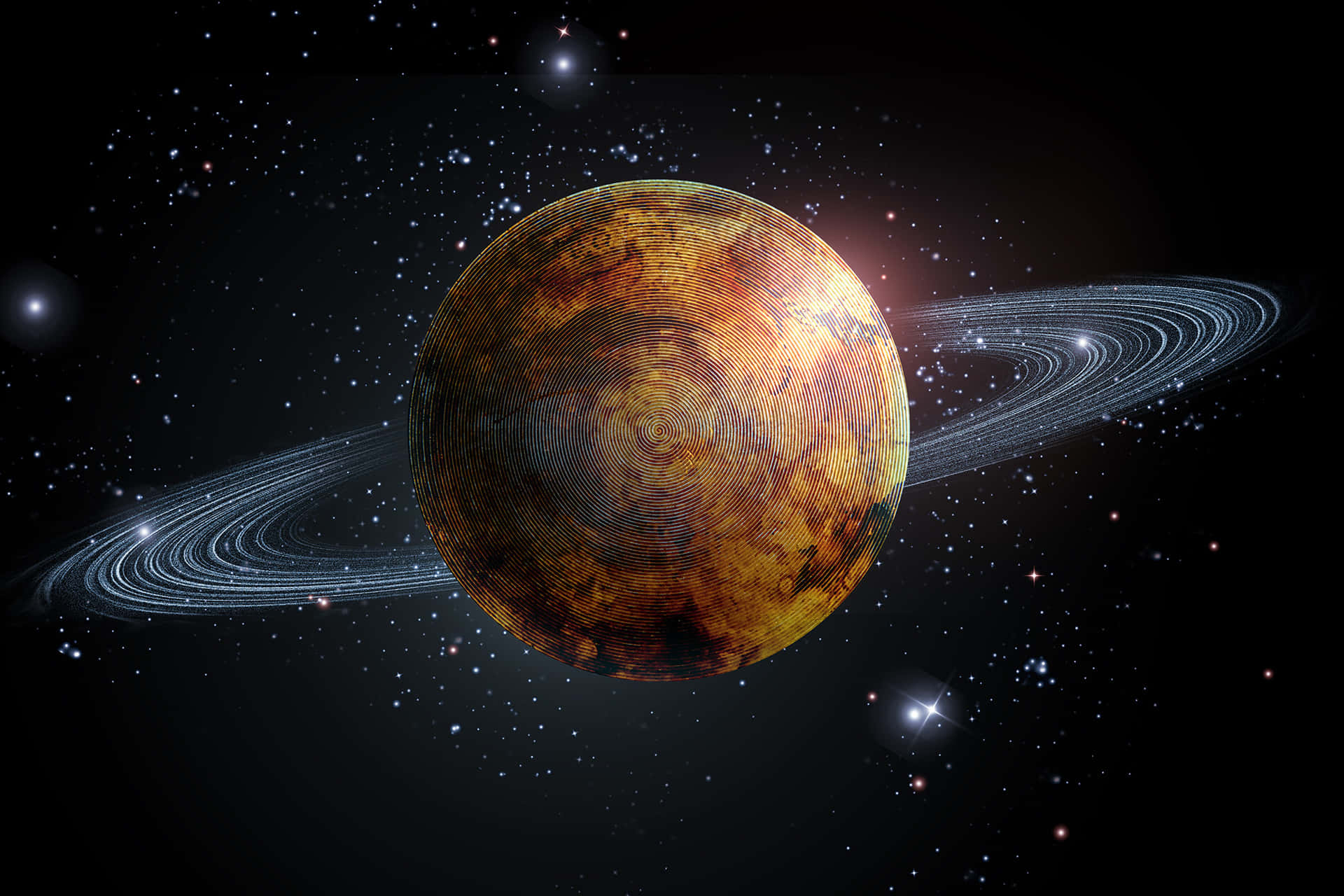The Meaning of Saturn
Roman Mythology
Saturn, the sixth planet from the Sun, holds a significant place in Roman mythology, where it was associated with agriculture, time, wealth, and liberation.
The Romans named this celestial body after their god, Saturnus, who reigned during a mythical golden age of peace and prosperity known as the “Saturnian Age.” This era was characterized by abundance and harmony, where work was minimal, and life revolved around feasting and celebration.
Saturnus was considered the god of agriculture, and his festival, Saturnalia, celebrated the winter solstice and marked a time of revelry, gift-giving, and social inversion. During this festive period, traditional roles were reversed, slaves were temporarily freed, and masters served their servants. The festivities symbolized the return of light after the shortest day of the year and the hope for renewal and abundance in the coming year.
Saturn’s association with time stemmed from his role as a god who oversaw the cyclical nature of seasons and harvests. His name may also be linked to “saturn,” an ancient Roman word meaning “to sow” or “to plant,” further highlighting his connection to agriculture and the passage of time.
The planet Saturn’s majestic rings, visible even through small telescopes, have often been interpreted as symbolic of the god’s power and influence. The rings were believed to represent the boundaries of Saturn’s dominion, marking the limits of his celestial realm.
While Saturn was associated with abundance and prosperity in his mythical role, he was also linked to hardship and change. As the Roman Empire declined, Saturnus became associated with melancholy and a sense of foreboding. This duality reflects the complexities of life, where periods of joy and abundance are often followed by times of challenge and transformation.
Associations with Agriculture
Saturn, the sixth planet from the Sun, has captivated humanity for millennia. Its striking pale yellow hue and prominent rings have inspired countless myths, legends, and scientific inquiries.
The Roman god Saturn is believed to be the namesake of the planet. A deity associated with agriculture, time, wealth, liberation, and renewal, Saturn held a significant place in the Roman pantheon. He was particularly revered as the father of Jupiter, king of the gods, and founder of the golden age, a mythical period of peace, abundance, and prosperity.
Saturn’s association with agriculture stems from its position in the sky as the harvest god. Ancient Romans observed that Saturnalia, a festive period dedicated to the planet, coincided with the winter solstice, a time of agricultural reflection and preparation for the coming spring planting season.
The slow movement of Saturn across the zodiac also contributed to its connection with agriculture. As a “slow mover,” its influence was perceived as long-lasting and profound, mirroring the cyclical nature of agricultural growth and harvest.
In mythology, Saturn’s reign over the golden age represented a period of bountiful harvests and prosperity for humankind. This connection to abundance further solidified his status as the patron god of agriculture.
Origin of the Name
Ancient Babylonian Origins
The name “Saturn” has its roots in ancient Roman mythology. It derives from the Latin word *Satum*, which was itself likely influenced by an older Italic or Proto-Italic word.
However, the planet’s association with the Roman god Saturn stretches back even further to the ancient Babylonians. These skywatchers, renowned for their astronomical observations and meticulous record keeping, identified a prominent celestial body they called *Nabu*.
This Babylonian deity was primarily associated with wisdom, writing, and knowledge. Over time, the Babylonians began to connect *Nabu* with the planet itself, likely due to its slow, deliberate movement across the sky compared to other planets.
The Greeks adopted this planetary identification and associated it with their own god of agriculture, Cronus. They named the planet after Cronus, who was also known as Saturn in Roman mythology. This blending of Babylonian astronomical knowledge with Greek and subsequently Roman religious traditions solidified the name “Saturn” for the sixth planet from the sun.
Interestingly, the ancient Greeks recognized that their Cronus/Saturn wasn’t exactly aligned with the Babylonian *Nabu*. The connection was more about the celestial body itself rather than a perfect mirroring of attributes. This shows how cultures throughout history have interpreted and integrated their observations of the cosmos into their existing belief systems.
Greek Influence History and Evolution of the Name
The name Saturn originates from the Roman god of agriculture, wealth, and time.
This deity was known as “Saturnus” in Latin and was believed to be the father of Jupiter.
He was associated with the golden age, a mythical era of peace and prosperity.
The Romans borrowed heavily from Greek mythology, so Saturn’s origins lie partly in the Greek god Cronus.
Cronus, the son of Uranus (sky) and Gaia (earth), overthrew his father and ruled the cosmos.
He was known as a timekeeper and associated with harvest and agriculture, similar to his Roman counterpart.
The influence of Greek mythology on the Roman god Saturn is evident in their shared characteristics and domains.
Both Cronus and Saturn were depicted with a scythe, representing time’s passage and the cycle of seasons.
They were also associated with agriculture and abundance, reflecting the importance of these aspects to both cultures.
The name “Saturn” has evolved throughout history, but its core meaning has remained relatively consistent: a powerful deity associated with time, agriculture, and abundance.
It is widely used as a given name for males and has also been adopted in various fields, such as science (the planet Saturn) and music (the heavy metal band Saturnus).
Through Ancient Times
The name Saturn originates from the Roman god Saturnus, a deity associated with agriculture, time, wealth, liberation, and renewal. His festival, Saturnalia, was a week-long celebration marked by feasting, gift-giving, and social inversions.
Saturn’s mythological roots can be traced back to ancient Greek mythology, where he was known as Cronus. In Greek mythology, Cronus was the leader of the Titans, the primordial deities who ruled before the Olympian gods. He overthrew his father Uranus (sky) and became ruler of the cosmos.
Cronus was notorious for devouring his own children to prevent them from overthrowing him, as prophesied by a seer. However, his wife Rhea tricked him by giving him a stone wrapped in swaddling clothes instead of their youngest son, Zeus. Zeus grew up in secret and eventually challenged Cronus, leading to a war between the Titans and the Olympians.
Zeus ultimately triumphed and imprisoned the Titans within Tartarus, the deepest part of the underworld. Cronus was then cast aside as an old and forgotten god. The Romans adopted Cronus into their pantheon as Saturnus, adapting his attributes and associating him with themes that resonated with their own agricultural society.
Saturn’s significance extended beyond mythology. Astronomers later identified the sixth planet from the sun as “Saturn” in honor of the Roman deity. Its prominent ring system further cemented the association with the god, as it was believed to represent Saturn’s vast wealth and bounty.
Modern Usage
The name “Saturn” originates from the Roman god of agriculture, wealth, time, and liberation.
In Roman mythology, Saturn was associated with abundance and prosperity, symbolized by his golden sickle which he used to harvest crops.
He was also considered the father of Jupiter, the king of the gods, and reigned as the supreme deity during the Golden Age, a mythical era of peace and happiness.
Saturn’s influence extended beyond agriculture; he was linked with time because his slow movement across the sky made him appear to “drag” its passage.
This association with time is reflected in the word “Saturday,” which derives from Saturn’s name.
The planet named after him, discovered by ancient astronomers, was known as “Saturn” due to this shared connection.
Today, “Saturn” retains its association with time and cycles.
- It can be used metaphorically to describe slow progress or a gradual decline (“the Saturnine pace of the negotiations”).
- It also carries connotations of wisdom and experience, reflecting the planet’s slow, deliberate movement across the sky.
“Saturn” continues to resonate in modern language, evoking both ancient mythology and cosmic wonder.
Let me know if you’d like to explore any aspect of this further!
The name *Saturn* has deep roots in Roman mythology and astronomy.
It honors *Saturn*, the Roman god of agriculture, time, wealth, liberation, and renewal.
In Roman mythology, Saturn was a powerful deity associated with both bountiful harvests and societal upheaval.
He ruled during a mythical golden age known as *Saturnalia*, a time of feasting, merrymaking, and social inversion where roles were reversed.
The planet’s name reflects its historical significance.
It was named after the Roman god due to its slow, stately movement across the sky, reminiscent of the agricultural cycles associated with Saturn.
Let me know if you’d like to explore any aspect of this further!
- Best Datanyze Alternatives for 2025 - April 26, 2025
- Best Coldlytics Alternatives for 2025 - April 25, 2025
- Best Brevo Alternatives for 2025 - April 25, 2025


